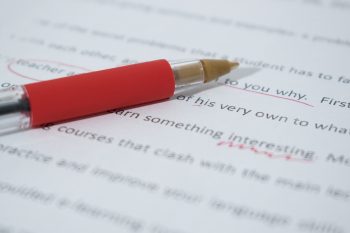Published: July 3, 2019
 Good copy editors are not ordinary people. Their brains are wired to see anomalies, deviations, and inconsistencies in the text. We are lucky to have them in our midst.
Good copy editors are not ordinary people. Their brains are wired to see anomalies, deviations, and inconsistencies in the text. We are lucky to have them in our midst.
A good copy editor will make sure that your book meets professional standards and will keep you from publishing a book with embarrassing mistakes.
Once you understand a bit more about what different kinds of editors can do for you and your manuscript, you can use these guidelines to determine how to hire an editor.
Good editors can be found in all sorts of ways. I suggest contacting a professional editing group such as the Editorial Freelancers Association or the American Copy Editors Society. You also might want to check for local organizations; here in the northwest, we have the Northwest Editor’s Guild, for instance.
Follow these guidelines to ensure you and your editor are on the same page.
- Agree on a price per word or per page.
If you agree on a page price, each page should be formatted in Times New Roman, 12 point, with one-inch margins on all sides. There’s no point in paying more if you like to work in a larger font. Conversely, you shouldn’t try to decrease the page number by using a small font or narrow margins.
- Request a sample edit of five or ten pages.
If you have questions about the edits or disagree with the editor’s approach or scope, discuss with them BEFORE they continue.
- Agree on a style book to use as a guide.
Book editors typically use The Chicago Manual of Style, but you may have a technical specialized manuscript that calls for a different type of style book.
- Request that the editor provide a final style sheet specific to your manuscript.
This should include a list of proper names, unusual spellings, and any style or formatting issues particular to the manuscript.
- Agree on a format for markup
Will the editor make corrections and give you notes using Track Changes? Or Will he or she print the manuscript and make notes by hand? Who will be responsible for the final text?
- Determine who will proofread the book before publication.
Many authors do this themselves or ask friends or family members to go through the printed book.
As you are seeking editors, be sure to ask for referrals, and check with other clients to see if the editor met their expectations, both time and money-wise. It’s important to let a prospective editor knows what you are asking for and that you agree on how you would like him or her to input changes.
Once your manuscript is edited, you will have to go through it to review the edits, if it’s done manually, and enter the changes. If it’s done electronically, you’ll need to accept or reject the changes. In doing so, keep in mind that you don’t have to accept all the edits.
There may be some that you disagree with or that you feel change the meaning of what you’re saying. But do consider that an editor is an intelligent, non-invested first reader, and give appropriate weight to his or her suggestions.
If hiring an editor is absolutely out of the question, self-editing could be an options. Our next post makes some suggestions if you decide to go that route.